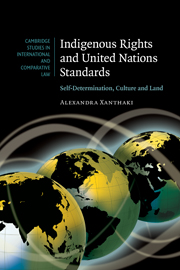Book contents
- Frontmatter
- Contents
- Table of cases
- Table of statutes
- Acknowledgments
- Introduction
- 1 Recognition of cultural membership and implications
- Part I United Nations instruments on indigenous peoples
- Part II Thematic analysis
- Conclusions
- Bibliography
- Index
- CAMBRIDGE STUDIES IN INTERNATIONAL AND COMPARATIVE LAW
1 - Recognition of cultural membership and implications
Published online by Cambridge University Press: 25 July 2009
- Frontmatter
- Contents
- Table of cases
- Table of statutes
- Acknowledgments
- Introduction
- 1 Recognition of cultural membership and implications
- Part I United Nations instruments on indigenous peoples
- Part II Thematic analysis
- Conclusions
- Bibliography
- Index
- CAMBRIDGE STUDIES IN INTERNATIONAL AND COMPARATIVE LAW
Summary
Introduction
The recognition of collectivities and collective rights is one of the most contested issues in international law and politics. For some, group rights are in stark contrast with the traditional approach of liberal rights theory, which views human rights as individual rights. The extensive philosophising on cultural membership is generally perceived by international lawyers as very engaging and relevant to debates on collective rights; yet, sometimes it appears to be ignoring new developments in international law. If international law is defined as the system of rules and principles that govern international relations, its normative directions on the issue cannot be ignored. Indigenous claims provide an excellent example of the importance of cultural membership and its challenges.
The importance of cultural membership
Although indigenous claims include individual rights, in their overwhelming majority they are famously of a collective nature. Indeed, the collective element is prominent in indigenous claims, from self-determination to cultural rights and land resources. Indigenous peoples view the recognition of their collective rights as a token of respect towards their identity and communities as well as the only way for their survival and development. As long ago as 1989 indigenous leaders agreed on the following statement:
[T]he concept of indigenous peoples' collective rights is of paramount importance. It is the establishment of rights of peoples as groups, and not merely the recognition of individual rights, which is one of the most important purposes of this Declaration [on the rights of indigenous peoples]. Without this, the Declaration cannot adequately protect our most basic interests. This must not be compromised. (emphasis added)
- Type
- Chapter
- Information
- Indigenous Rights and United Nations StandardsSelf-Determination, Culture and Land, pp. 13 - 46Publisher: Cambridge University PressPrint publication year: 2007
- 1
- Cited by



